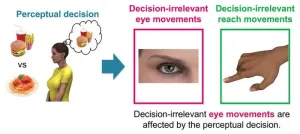(Press-News.org) A study led by researchers at the UCLA Jonsson Comprehensive Cancer Center sheds new light on why tumors that have spread to the brain from other parts of the body respond to immunotherapy while glioblastoma, an aggressive cancer that originates in the brain, does not.
In people with tumors that originated in other parts of the body but spread to the brain, treatment with a type of immunotherapy called immune checkpoint blockade appears to elicit a significant increase in both active and exhausted T cells — signs that the T cells have been triggered to fight the cancer. The reason the same thing doesn't occur in people with glioblastoma is that anti-tumor immune responses are best initiated in draining lymph nodes outside of the brain, and that process does not occur very effectively in glioblastoma cases.
To date, immunotherapy has not been effective in treating glioblastoma, but it has been shown to slow or even eradicate other types of cancer, such as melanoma, which frequently metastasizes to the brain.
The new research, published in the Journal of Clinical Investigation, could help improve the effectiveness of immunotherapy for people with brain tumors and it could suggest new paths in the effort to help develop more effective therapies.
“If we’re going to try to develop new therapies for solid tumors, like glioblastoma, which are not typically responsive, we need to understand the tumor types that are responsive, and learn the mechanisms by which that happens,” said the study’s senior author, Robert Prins, a professor of molecular and medical pharmacology and of neurosurgery at the David Geffen School of Medicine at UCLA.
The researchers studied the immune cells obtained from nine people with metastatic brain tumors who had been treated with immune checkpoint blockade — which works by harnessing the body’s immune system to destroy cancer cells — and compared their observations with immune cells taken from 19 patients with brain metastases that not been treated with immunotherapy.
They used a technique called single-cell RNA sequencing to examine the genetic material in both sets of samples, and then compared the data to previously published analyses of 25 recurrent glioblastoma tumors to better understand the effect the immunotherapy had on T cells.
“We really were trying to figure out which immune cells are changing in the more responsive tumors in order to better explain the higher response rate to the treatment,” said the study’s co-first author, Lu Sun, a project scientist in the Geffen School of Medicine’s neurosurgery department. “No study has comprehensively examined the differential effect of immune checkpoint blockade treatment on these two types of brain tumors before.”
In the tumors that had spread to the brain, the researchers saw that the T cells had specific characteristics associated with fighting tumors entering the brain, most likely due to a more effective priming step that occurs outside of the brain.
Before traveling to the brain, T cells are first activated in the lymph nodes. During this process, a type of immune cells called dendritic cells share information about the tumor to T cells so they can better attack the tumor. This priming process, however, doesn't work very effectively when doctors attempt to use immune checkpoint blockade for treating glioblastoma.
The researchers also found that a specific subgroup of those exhausted T cells was associated with longer overall survival in people whose cancer had metastasized to the brain.
“We found quite a significant difference between the two types of brain tumors and how they respond to immunotherapies,” said study author Dr. Won Kim, surgical director of UCLA Health’s brain metastasis program and a member of the Jonsson Cancer Center. “There was a tremendous number of T cell lymphocytes that were found within brain metastases following immunotherapy, and while the number of T cell lymphocytes also increased in glioblastoma patients, it wasn’t anywhere near the same extent.”
Prins, who is also a researcher at the Jonsson Cancer Center, said that finding “suggests that enhancing the activation and presentation of T cells by dendritic cells could be a potential treatment strategy.”
In future studies, the researchers plan to analyze data from a larger, more uniform group of people who were diagnosed with melanoma that had spread to the brain.
The study’s other co-first author is Jenny Kienzler, who was a UCLA fellow in neurosurgery when the research was conducted. Other UCLA authors are Jeremy Reynoso, Alexander Lee, Eileen Shiuan, Shanpeng Li, Jiyoon Kim, Lizhong Ding, Amber Monteleone, Geoffrey Owens, Dr. Richard Everson, David Nathanson, Dr. Timothy Cloughesy, Gang Li, Dr. Linda Liau and Willy Hugo.
The research was supported by grants from the National Institutes of Health Specialized Programs of Research Excellence in Brain Cancer, National Cancer Institute, National Institutes of Health National Center for Advancing Translational Science, Parker Institute for Cancer Immunotherapy, Brain Tumor Funder’s Collaborative and Cancer Research Institute.
END
Study could help explain why certain brain tumors don’t respond well to immunotherapy
Immune checkpoint blockade has been ineffective for treating glioblastoma; UCLA-led research may reveal why
2023-09-01
ELSE PRESS RELEASES FROM THIS DATE:
Red blood cells exposed to oxygen deficiency protect against myocardial infarction
2023-09-01
Red blood cells exposed to oxygen deficiency protect against myocardial infarction, according to a new KI study published in the Journal of Clinical Investigation. The study also shows that the protective effect is enhanced by a nitrate-rich vegetable diet.
Red blood cells carry oxygen from the lungs to all of the body’s cells and carbon dioxide back to the lungs. A new study, conducted at Karolinska Institutet in collaboration with Karolinska University Hospital, now shows that red blood cells have an intrinsic function of protecting against ...
UMC Utrecht investigates the link between RSV infection and chronic respiratory tract disease
2023-09-01
UMC Utrecht will lead an international consortium that will try to answer a key question that’s in the mind of many pediatricians, infectiologists, pulmonologists and other health professionals: “Why are children that had an RSV infection in early childhood at increased risk of developing asthma later in life?” The project - which will run for five years - is funded by a HORIZON HLTH 2023 grant from the European Commission of € 7 million.
Chronic respiratory tract diseases such as asthma and COPD ...
Study shows making cities greener doesn’t just capture carbon – it reduces it
2023-09-01
Dozens of European cities could reach net zero carbon emissions over the next 10 years by incorporating nature into their infrastructure, according to a new study.
Published recently in the journal, Nature Climate Change, the analysis shows the ways cities can orchestrate a wide range of green solutions like parks, streetscaping and roof gardens to not only capture carbon emissions, but help reduce them.
The study was undertaken by researchers from Sweden, the U.S. and China. It recommends the most effective approaches for natural carbon sequestration in 54 cities in the EU. And it shows how blending these steps with other climate ...
Researchers find Antarctic ice shelves thinner than previously thought
2023-09-01
COLUMBUS, Ohio – As global ice dams begin to weaken due to warming temperatures, a new study suggests that prior attempts to evaluate the mass of the huge floating ice shelves that line the Antarctic ice sheet may have overestimated their thickness.
The research, recently published in the Journal of Glaciology, is the first large-scale study of its kind to compare ice shelf thickness data from ice-penetrating radar measurements to thickness data estimated from contemporary surface elevation measurements.
By juxtaposing vast datasets of 20 of the 300 ...
Di-isononyl phthalate disrupts pregnancy in mice, study finds
2023-09-01
We are constantly exposed to phthalates in our environment through plastic products such as storage containers, medical devices, packages, fabrics, and toys. Specifically, di-isononyl phthalate is inevitably becoming a part of our lives. Unfortunately, the impact of DiNP on the establishment and maintenance of pregnancy is largely unknown. In a new study, researchers used mice to understand how DiNP affects pregnancy.
“Although we finally recognize that environmental chemicals impact women's health, most studies have focused on men’s reproductive health and very few studies have looked at how these chemicals affect women,” said Jodi Flaws (EIRH co-leader/MME), ...
Health System Program Improved Equity in Allocation of Scarce Medication
2023-09-01
A program designed to ensure fairness and that people living in the most disadvantaged U.S. neighborhoods would be offered a scarce, potentially life-saving medication proved feasible in a large health system. The approach can improve equity in receipt of the drug by people disproportionately affected by disease, according to a new analysis published today in JAMA Health Forum by University of Pittsburgh and UPMC scientist-clinicians.
However, the study revealed that more work needs to be done in building trust with and improving the ability to contact Black patients to ensure they ultimately receive scarce medications and other health care resources ...
Weighted lottery to equitably allocate scarce supply of COVID-19 monoclonal antibody
2023-09-01
About The Study: The results of this study suggest that a weighted lottery to allocate scarce resources is feasible and may result in more drug allocation to individuals who reside in disadvantaged neighborhoods and who identify as Black; however, Black individuals allocated the drug may be less likely to accept allocation and receive it.
Authors: Erin K. McCreary, Pharm.D., of the University of Pittsburgh School of Medicine, is the corresponding author.
To access the embargoed study: Visit ...
Telehealth vs in-clinic medication abortion services
2023-09-01
About The Study: The findings of this study suggest that telehealth medication abortion services (tele-MAB) facilitates abortion care access for those further from brick-and mortar abortion facilities and, thus, may mitigate the impacts of travel logistics and costs. Additionally, tele-MAB may better meet the needs of those with prior abortion experience, perhaps due to greater familiarity with the abortion process.
Authors: Anna E. Fiastro, M.P.H., M.E.M., Ph.D., of the University of Washington in Seattle, is the corresponding author.
To access the embargoed study: Visit our For The Media website at this link https://media.jamanetwork.com/
(doi:10.1001/jamanetworkopen.2023.31900)
Editor’s ...
The eyes are a window into the deciding mind
2023-09-01
Researchers worldwide are seeking visible indicators of what is going on inside our minds as we think about issues and take decisions. They are searching for the ability to probe the invisible workings of the mind by monitoring subtle signals from the body. New insights from experiments at Tohoku University have revealed a link between eye movements and certain types of decision-making. Kazumichi Matsumiya and Shota Furukawa at the university's Graduate School of Information Sciences reported their findings in the journal Communications Biology.
"Our work has revealed that eye movements that are not ...
Three types of boreal summer intraseasonal oscillation influence precipitation over the Yangtze river valley in various ways
2023-09-01
The Yangtze River Valley (YRV) is one of the most densely populated and economically developed regions in China. Summer precipitation over this region shows considerable intraseasonal variability with a period of 10–90 days, which can induce extreme precipitation events and lead to massive economic losses and human casualties.
The Boreal Summer Intraseasonal Oscillation (BSISO) is the intraseasonal variability active in the tropical Indian Ocean and western Pacific region. Over the last three decades, scientists have studied the influence of the BSISO, because it is an essential predictability source in extended-range forecasts.
A new study published in Atmospheric ...
LAST 30 PRESS RELEASES:
Reconstructing the world’s ant diversity in 3D
UMD entomologist helps bring the world’s ant diversity to life in 3D imagery
ESA’s Mars orbiters watch solar superstorm hit the Red Planet
The secret lives of catalysts: How microscopic networks power reactions
Molecular ‘catapult’ fires electrons at the limits of physics
Researcher finds evidence supporting sucrose can help manage painful procedures in infants
New study identifies key factors supporting indigenous well-being
Bureaucracy Index 2026: Business sector hit hardest
ECMWF’s portable global forecasting model OpenIFS now available for all
Yale study challenges notion that aging means decline, finds many older adults improve over time
Korean researchers enable early detection of brain disorders with a single drop of saliva!
Swipe right, but safer
Duke-NUS scientists identify more effective way to detect poultry viruses in live markets
Low-intensity treadmill exercise preconditioning mitigates post-stroke injury in mouse models
How moss helped solve a grave-robbing mystery
How much sleep do teens get? Six-seven hours.
Patients regain weight rapidly after stopping weight loss drugs – but still keep off a quarter of weight lost
GLP-1 diabetes drugs linked to reduced risk of addiction and substance-related death
Councils face industry legal threats for campaigns warning against wood burning stoves
GLP-1 medications get at the heart of addiction: study
Global trauma study highlights shared learning as interest in whole blood resurges
Almost a third of Gen Z men agree a wife should obey her husband
Trapping light on thermal photodetectors shatters speed records
New review highlights the future of tubular solid oxide fuel cells for clean energy systems
Pig farm ammonia pollution may indirectly accelerate climate warming, new study finds
Modified biochar helps compost retain nitrogen and build richer soil organic matter
First gene regulation clinical trials for epilepsy show promising results
Life-changing drug identified for children with rare epilepsy
Husker researchers collaborate to explore fear of spiders
Mayo Clinic researchers discover hidden brain map that may improve epilepsy care
[Press-News.org] Study could help explain why certain brain tumors don’t respond well to immunotherapyImmune checkpoint blockade has been ineffective for treating glioblastoma; UCLA-led research may reveal why






